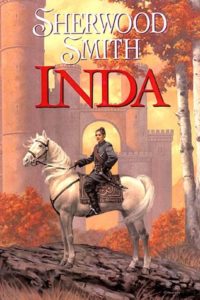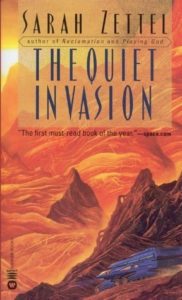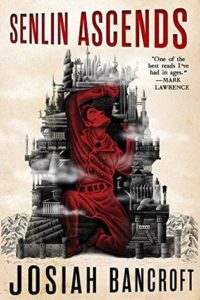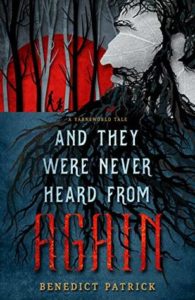All told, I read 70 novels and novellas by 53 different authors in 2020, plus 20-odd pieces of short fiction (I’m going to try to actually keep track in 2021, but it’s a little late for 2020). Overall, I rated 15 books by 11 different authors at 17 or higher on my 20-point scale and had three short stories that I found really exceptional. Here they are, split out by subgenre.
Epic/Secondary World Fantasy
A Shadow in Summer (full review), A Betrayal in Winter, and An Autumn War (Books 1-3 of The Long Price Quartet) by Daniel Abraham.
The best three books I’ve read this year have been the first three books of The Long Price Quartet. They’re slow-paced and intensely character-driven, presenting dilemmas that don’t have easy answers and whose consequences have ramifications decades down the line. If you like epic fantasy and don’t mind slow builds and relatively little action, I cannot recommend this series more highly.
The Sword of Kaigen by M.L. Wang
This book really opened my eyes to the quality that can be found in self-published fiction. The story centers around two characters—Misaki and Mamoru, a mother and son—and a war to protect their homeland from invaders. The war has some intense action scenes with heavy anime inspiration, but the two things I love most about this book are the Misaki’s storyline and the time spent on the aftermath of the fighting. Misaki has dreams to be more than what society has dictated for her, but she has a family that she loves and that she can’t abandon. Her struggle to carve a path for herself in the midst of upheaval is so compelling. It’s a big rough around the edges, with a lot of new vocabulary, some infodumping up front, and an awkward tie-in to her sequel series (which I believe she wrote as a teenager), but the things it does well are so good that it’s one of my favorite books even without any extra polish.

Inda and The Fox (Books 1-2 of the Inda Quartet) by Sherwood Smith
Inda has a bunch of political houses scheming to their own advantage, as you would see from a series like A Song of Ice and Fire, plus a relatively gritty world where bad things happen to characters you like. But it also has some genuinely good-hearted characters who affect everyone around them for the better. There are a whole lot of names to learn (especially because everyone seems to have three different names that are used interchangeably), but the characters are so likable that it’s worth putting in the effort. There are also significant portions of the series set in a military school (a setting that I love and that is done exceptionally well) and on the high seas (which I don’t love as much but is also done well). If you like large-scale epic fantasy that’s lower on the magic and higher on the political scheming but still want to have a decent person to pull for, give this series a read.
The Golden Key by Melanie Rawn, Jennifer Roberson, and Kate Elliott
The Golden Key feels like a small-scale fantasy—there is never any world-ending threat, with the action and the stakes staying in a small city-state with heavy Italian inspiration—but the temporal scale is massive, with gaps spanning centuries in the interludes between the three parts (each written by a different author). The story focuses on two families, one of rulers and one of artists, and the art-based magic that keeps them in power. This is a long book that almost feels like a trilogy in a single binding, but it has plenty of interesting characters and hard-hitting emotional moments.
Orconomics by J. Zachary Pike
What if we had an entire world running on RPG economics? This is the premise of Orconomics, as it simultaneously satirizes both RPGs and Wall Street excesses. Though I’ve not played many RPGs, I was familiar enough to get the jokes, which were fun and clever and sometimes insightful. But the story was destined for the “heh, that’s fun, now I’ll move on” bin until the last quarter, when I discovered that I suddenly cared about the members of our band of RPG archetypes. This story has heart and an emotional punch that sneaks up on you. I immediately read the sequel (which I didn’t rate five stars only because it loses steam in the last quarter or so—after what I consider the emotional climax—but it hits hard as well).
Urban/Portal Fantasy
The Ten Thousand Doors of January by Alix E. Harrow
A beautifully written coming-of-age portal fantasy that sees a girl discover new worlds and take on the powerful men in her life that would keep her from them. It reads a bit like an adult fairy tale, not trying to solve the hard problems of the world but giving the reader a fun story about a character that’s easy to like, all wrapped in some lovely prose. I see a lot of parallels with Where the Crawdads Sing–the book all the non-genre fans were reading in 2019—and I suspect this might be a good entry point into fantasy for fans of Delia Owens’ debut.
Science Fiction
The Murderbot Diaries (full review) by Martha Wells
I’ve already said my piece on The Murderbot Diaries, but they’re fun, fast-paced stories with an absolutely incredible main character, a socially awkward AI who just wants to hole up and watch TV but has to keep stepping in to help humans in peril.

The Quiet Invasion by Sarah Zettel
A first contact novel in which both humans and aliens are so wrapped up in their own political struggles that they see contact with intelligent life as a bit of a sideshow. Features lots of scheming, some of the best aliens I’ve come across, and one of my favorite characters of the year.
The Calculating Stars by Mary Robinette Kowal
This is basically 25% disaster story and 75% women (and, to a lesser extent, racial minorities) proving their competence and forcing grudging respect from the racist and sexist powers-that-be. Part one hits hard and is absolutely riveting. Part two slows down quite a bit but still tells a quality story. Would recommend for fans of Hidden Figures.
Greats That Resist Categorization

Senlin Ascends and Arm of the Sphinx (Books 1-2 of The Books of Babel) by Josiah Bancroft
It’s the classic “unexceptional and completely unprepared dude gets dropped into the deep end and has to learn to swim” brand of adventure. What makes it exceptional is the world itself—The Tower of Babel has an entirely different society on every level, and they’re fantastically odd and often Kafkaesque—and the expert presentation of a character going from totally overwhelmed to a force to be reckoned with.
The Lost Steersman (Book 3 of The Steerswoman Series) by Rosemary Kirstein
The Steerswoman series follows Rowan, a traveling scholar who lives by logic, analytical thinking, and a guild code that requires her to answer any question truthfully, as long as her interlocutors answer her own questions truthfully as well. When she and her warrior friend Bel start investigating the origin of a mysterious gem, they realize that a group of wizards will go to great lengths to keep that information a secret. The first book is good—it’s easy reading, it’s fun, it has a great friendship between Rowan and Bel, and there’s some entertaining trope-subversion. But the third book broadens the world, ratchets up the stakes, and deepens the themes, while keeping the great aspects. I won’t give specifics, because I don’t want to spoil anything, but this is a really good under-the-radar series.
Short Fiction

“And They Were Never Heard From Again” (2019) by Benedict Patrick (author site, with link to free copy)
A deeply atmospheric dark fairy tale set in the creepy forest featured in Patrick’s They Mostly Come Out at Night, the first novel in the Yarnsworld shared universe. This story stands alone, but it’ll make you want to read the other Yarnsworld books.
Proof of Existence (2020) by Hal Y. Zhang (full text)
Time travel, science, and interpersonal relationships take center stage in a short that stretches the mind and tugs at the heartstrings.
A Guide for Working Breeds (2020) by Vina Jie-Min Prasad (full text)
I’m not even a dog person, and this story was adorable, and just what we need in the year 2020. It inspired me to look back at the author’s 2018 Hugo nominee “Fandom for Robots,” which was similarly heartwarming.
